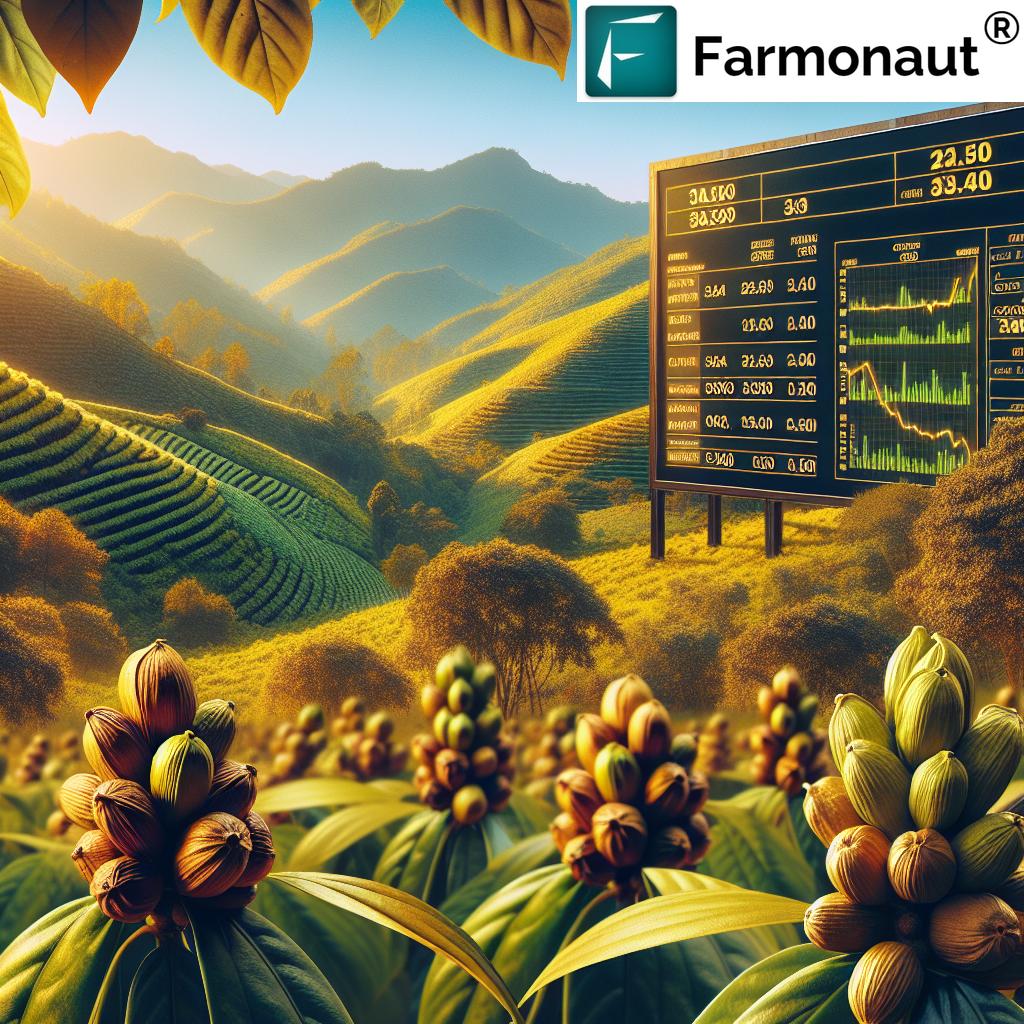Avocado Price Philippines 2025 & Farm Trends in Agriculture
The Future of Avocado Farming in the Philippines: Price Trends and Agricultural Prospects for 2025
Table of Contents
- Introduction
- Key Trivia: Rising Avocado Demand
- Current Status of Avocado Farming in the Philippines
- Avocado Price Philippines 2025: Trends & Projections
- Yearly Avocado Price & Production Trend Table
- Market Demand, Growth, and Export Opportunities
- Evolving Avocado Farming Practices and Technologies
- How Satellite Technology Enhances Avocado Farming
- Advanced Crop and Farm Management with Farmonaut
- Agricultural and Economic Implications
- Trivia: Export Expansion in 2025
- Future Prospects & Sustainable Development
- FAQ: Avocado Price, Farming, and Trends 2025
- Conclusion
“Avocado demand in the Philippines is projected to rise by 12% in 2025, driving market expansion and farm investments.”
Understanding the Current Status of Avocado Farming in the Philippines
The avocado farm Philippines sector has steadily gained traction within the ever-evolving agricultural landscape during the past decade. Traditionally, avocado cultivation was overshadowed by staple crops like rice and coconut. However, due to increasing interest, particularly in regions such as Benguet, Davao, and Bukidnon, avocado farming has become a promising alternative for farmers seeking income diversification and growth.
These areas benefit from higher altitudes and slightly cooler temperatures—critical conditions for optimal yield and fruit quality. The Philippines’ tropical climate, combined with the right zones, provides the suitable environment required for superior avocado production.
- Dominance of Smallholder Farmers: Most avocado farm Philippines operations are run by smallholders, often employing traditional farming techniques passed down through generations.
- Challenges in Production: Many farmers face challenges like inconsistent supply, poor post-harvest handling, limited access to quality inputs, and a lack of mechanization.
- Government Initiatives: Recognizing these constraints, government agencies and agricultural organizations are promoting modernization—like grafted seedlings, integrated pest management, better post-harvest technologies, and improved resource management.
- Local Consumption Patterns: Filipino consumers traditionally enjoyed avocados as fresh fruit. Today, evolving tastes mean increased consumption in smoothies, desserts, and health-focused foods, driving local demand.
Altogether, the avocado sector in the Philippines is emerging as a key player within the diverse ecosystem of agriculture in Philippines.
Avocado Price Philippines 2025: Key Trends, Influences, and Projections
Avocado price Philippines 2025 remains a hot topic due to the interplay between local demand, production, export opportunities, and farming practices. As we approach 2025, it is essential to understand the trends shaping this market and what they mean for Philippine farmers and agribusinesses.
Influencing Factors on Avocado Price Philippines 2025
- Domestic Demand: Filipino consumers are increasingly embracing fresh avocados and avocado-based products as health awareness, urbanization, and culinary innovation rise.
- Production Capacity: Expanded cultivation and improved practices are growing supply, yet climate variability (typhoons, rainfall, temperature fluctuations) creates periodic shortages and price fluctuations.
- Export Growth: Export opportunities to countries like Singapore, Hong Kong, and Japan add pressure on local supply while lifting farmgate prices for premium varieties such as Hass.
- Global Market Trends: Higher global demand and increased openness to Philippine tropical fruits reinforce a favorable, upward trend in prices.
- Government Intervention: Support in infrastructure, technology adoption, and policies for sustainable export expansion directly affect price stability and prospects.
Projections: Most analyses suggest avocado price Philippines 2025 will rise by 10–15% compared to 2023 levels, especially for export-grade fruit. Urban retail prices may fluctuate more sharply depending on post-harvest practices and international competition.
Key Takeaway: The price outlook is favorable, but only with sustained improvements in agricultural practices and investment in technology—such as those we at Farmonaut support—can consistency in price growth be achieved.
Yearly Avocado Price & Production Trend Table
To offer a comprehensive view of avocado price Philippines 2025 against past data, here is a structured table consolidating year-wise estimates. This helps identify patterns in production, demand, and export evolution for better decision-making in agriculture in Philippines.
| Year | Estimated Avg Price per kg (₱) | Estimated National Production (tons) | Estimated Local Demand (tons) | Estimated Export Volume (tons) | Key Influencing Factors |
|---|---|---|---|---|---|
| 2021 | ₱80 | 37,000 | 30,000 | 800 | Post-pandemic recovery, traditional practices, spotty irrigation |
| 2022 | ₱88 | 38,500 | 31,500 | 900 | Supply chain improvements, minor typhoon events |
| 2023 | ₱98 | 40,000 | 33,000 | 1,000 | Increased demand, better seedling adoption, moderate El Niño |
| 2024 | ₱105 | 43,000 | 36,000 | 1,200 | Government support, surge in export inquiries, improved post-harvest |
| 2025 (Projected) | ₱112 | 47,000 | 40,500 | 1,380 | Export push, climate adaptation, rise in local consumption, new tech adoption |
By reviewing the above, avocado price Philippines 2025 appears set for continued growth amid rising demand and expanding production. The future is influenced by a balanced interplay of market dynamics, climate factors, technology adoption, and strong government support.
Expanding Market Dynamics: Consumption, Growth, and Export Trends
Avocado’s popularity is accelerating not only in the domestic market but also in export destinations, influenced by rising global health awareness and the unique positioning of tropical avocados from the Philippines.
Trends in Domestic Consumption and Growth
- Higher Urban Consumption: Cities like Manila, Cebu, and Davao headline sharp increases in avocado purchases—driven by expansion of health-based eateries, smoothie bars, and supermarkets.
- Diversification of Products: Avocados are being used in ice creams, shakes, health drinks, and innovative desserts, broadening appeal to younger and health-conscious segments.
- Income Growth for Farmers: As farmgate prices trend upward, farmers benefit from superior margins versus traditional staple crops.
Export Opportunities and Global Demand
- Rising Global Demand: Export of avocados from the Philippines is set to climb by an estimated 15% in 2025, delivering new revenue channels and boosting the profile of Philippine agriculture.
- Premium Varieties: Special attention to high-quality varieties like Hass and Fuerte is crucial for gaining traction in export markets, particularly in Asia Pacific and the Middle East.
- Quality Assurance and Traceability: Ensuring transparent, high-integrity production chains (leveraged via solutions such as Farmonaut’s blockchain-enabled traceability) helps Philippine exporters compete globally, avoid fraud, and build brand trust.
Evolving Avocado Farming Practices: Modernization, Quality, and Yield
Enhancing production and consistent yield requires an overhaul of traditional practices and the adoption of new technologies in the avocado farm Philippines sector.
Key Improvements in Farming Practices
- From Traditional to Integrated Farming: Many farmers are transitioning from smallholder, uncoordinated efforts to modern, integrated pest and nutrient management systems.
- Use of Grafted Seedlings: Improved seedling quality enables earlier fruiting and high disease resistance, essential for maintaining fruit quality and mitigating climate risks.
- Climate-Smart Techniques: Adoption of shade management, soil moisture monitoring, and windbreaks help stabilize yields against erratic weather, particularly in typhoon-prone regions.
- Post-Harvest Handling Innovation: Advanced cold chain systems, improved packaging, and timely transportation reduce post-harvest losses and preserve fruit quality for both local and export markets.
It is essential for farmers to keep abreast with advances in technologies—from field-based sensors for irrigation, to satellite monitoring tools for crop health analytics and environmental compliance.
Integrated agricultural advisory, environmental monitoring, and resource optimization are now accessible by using reliable satellite technology and AI-based solutions.
How Satellite Technology Enhances Avocado Farming in the Philippines
As avocado farming continues to rise, advanced technologies are becoming essential for staying competitive. Reliable, cost-effective crop monitoring and resource management solutions empower farmers and agribusinesses to:
- Monitor Crop Health in Real-Time: Satellite-based vegetation indices (like NDVI) help in early detection of plant stress, diseases, and nutritional deficiencies.
- Practice Precision Agriculture: Technologies offer data-driven recommendations for irrigation, fertilization, and plantation cycles to boost yields.
- Enhance Sustainability: Environmental analytics support the shift toward climate-smart and carbon-neutral farming (learn more about Farmonaut Carbon Footprinting).
- Meet Market & Export Standards: Blockchain-based traceability ensures product integrity all the way from field to market, which is crucial for accessing international markets.
Farmonaut: Advanced Crop Management and Insights for Avocado Farm Philippines
We at Farmonaut are committed to making satellite-driven intelligence both affordable and accessible for all users in the agriculture ecosystem. Through our advanced platform, Filipino farmers and agribusiness stakeholders can benefit in the following ways:
- Satellite-Based Monitoring: We provide multispectral satellite images that analyze crop health, soil conditions, and resource utilization, enhancing decision-making and boosting operational efficiency in avocado orchard management.
- Real-Time Advisory: Our Jeevn AI system delivers crop-specific, weather-tailored strategies for farm operations, which help optimize planting, irrigation, and harvest decisions across all seasons.
- Blockchain-Enabled Traceability: Farmonaut’s system offers reliable traceability solutions so exporters, buyers, and regulatory bodies can track fruit authenticity and mitigate fraud risks, crucial for growing export channels.
- Fleet and Resource Management: Large avocado growers can use our fleet management tools for logistics and vehicle tracking, reducing transport costs and improving safety. More details about this feature can be found on our Fleet Management solution page.
- Environmental Impact & Sustainability: For organizations committed to sustainable agriculture, our carbon footprint tracking tools provide actionable data on emissions and compliance.
- Access to Financing: Our platform helps streamline crop loan and insurance verification for farmers using satellite-based analytics, increasing access to credit and risk protection.
- Developer APIs: For businesses and partners seeking to integrate agricultural intelligence directly into their systems, we offer an accessible API, and complete developer documentation.
- Large-Scale Farm Management: To meet the needs of plantation managers, our Agro Admin App facilitates seamless management of extensive farm operations and plantation networks.
Our platform is accessible via web, Android, iOS, and API, allowing every avocado farmer Philippines, agribusiness, or exporter to harness actionable insights anytime, anywhere.
Avocado Price Philippines 2025: Agricultural and Economic Implications
The growth of avocado farming delivers benefits beyond farm incomes. Let’s examine the broad impact on agriculture in Philippines:
- Income Diversification: Avocados are a high-value crop, supporting steady income growth for rural farmers and reducing economic dependence on rice or coconut monocultures.
- Rural Development and Employment: Expansion of the avocado sector creates jobs across production, post-harvest handling, logistics, and agritech domains.
- Sustainable Practices: Government support for regenerative agriculture, input efficiency, and cold storage infrastructure encourages sustainable farming to meet both domestic demand and export quality standards.
- Export Revenues: Greater export volumes strengthen the country’s agricultural prospects, bringing in valuable foreign exchange and enhancing food resilience.
Role of Policy and Institutional Support
- Research & Development: Continuous investment in improved cultivars, pest/disease management, and climate adaptation will be critical for sustaining sectoral growth.
- Extension Services: Farmer training, digital literacy, and modernization grants help accelerate transition to higher productivity and export success.
- Infrastructure: Ensuring year-round availability and price stability requires modern cold storage, efficient logistics, and real-time market intelligence.
“Export of avocados from the Philippines could increase by 15% in 2025, reflecting global market growth and improved farming practices.”
The Future of Avocado Farming: Building Sustainable Growth for 2025 and Beyond
As we approach 2025, the avocado sector in the Philippines reflects a sector transformed by technological, economic, and market-driven forces:
Strategic Imperatives for Long-Term Prosperity
- Invest in Modern Farming Practices: Evolving from traditional efforts to smart, tech-enabled agriculture is essential for consistent yield, reduced losses, and meeting premium export quality requirements.
- Leverage Analytics and Satellite Insights: Using AI-driven advisory and real-time monitoring improves not only profitability but also compliance and sustainability.
- Expand Export-Grade Production: Focused breeding, good agricultural practices, and transparent traceability solutions will unlock premium export markets and maximize sectoral growth.
- Empower Rural Farmers: Technology democratization, financial inclusion (crop loan and insurance support), and targeted training ensure broad-based benefits.
- Foster Sustainable Agriculture: Measuring and managing carbon impact with tools like Farmonaut’s Carbon Footprinting not only opens new revenue streams, such as carbon credits, but also positions Philippine avocados as a green, resilient export.
Overall, avocado price Philippines 2025 is on a favorable trend, yet market volatility, climate risks, and the need for modernization require ongoing vigilance. By advancing innovation and sustainability—supporting the shift from traditional to integrated, tech-enabled agriculture—the Philippine avocado sector is poised for global leadership in the years ahead.
FAQ: Avocado Price Philippines 2025 & Agricultural Trends
Q1: What is the projected avocado price Philippines 2025?
A: Current projections suggest the average farmgate avocado price in the Philippines will reach about ₱112 per kilogram in 2025, up 10–15% from 2023. Retail prices may show greater fluctuations depending on urban demand and seasonal supply.
Q2: Which regions are best for avocado farm Philippines operations?
A: Regions such as Benguet, Davao, Bukidnon, Tagaytay, and select areas of Luzon and Mindanao provide suitable climate—moderate temperatures, high altitude, and stable rainfall—for profitable avocado cultivation.
Q3: What are the main market trends for avocados in 2025?
A: Key trends include increasing domestic demand due to health trends, rapid growth in export opportunities, adoption of modern agricultural technologies, and improved quality and traceability for local and export channels.
Q4: How can technology improve avocado farming practices?
A: Technologies such as satellite-based crop health monitoring, AI-driven advisory for weather and planting, and blockchain traceability help farmers increase yield, improve quality, reduce losses, and access new markets.
Q5: How can I access advanced farm management tools for avocado farming?
A: Products like Farmonaut’s web and mobile platform make it easy to remotely manage crop health, traceability, and resource logistics for every type of farm.
Q6: What is Farmonaut’s role in Philippine agriculture?
A: We empower Filipino farmers, agribusinesses, and institutions with accessible, affordable satellite insights, resource monitoring, AI-based advisories, and digital traceability. Our solutions are designed to maximize crop productivity, sustain environmental progress, and open up financing and export channels for all partners.
Q7: How do I integrate Farmonaut API with my agriculture business?
A:
To enrich your agricultural or supply chain systems with real-time satellite insights, visit our Farmonaut API page and review the developer documentation for integration guidelines. This allows seamless access to crop health, weather, and traceability data.
Q8: What support is available for avocado farmers seeking crop loans or insurance?
A: With Farmonaut’s verification solutions, banks and insurance providers receive reliable, satellite-based documentation, allowing improved and faster access to agricultural finance and risk management for farmers.
Conclusion: The Path Forward for Avocado Price Philippines 2025 & Philippine Agriculture
The avocado sector in the Philippines is on the verge of substantial expansion, with 2025 poised to bring higher prices, increased demand, and transformative farming practices. By adopting innovative technology, improving quality standards, and tapping into lucrative export markets, Philippine farmers and agribusinesses can unlock greater security, profitability, and global reach in a rapidly-evolving industry.
We stand ready to support this transition with satellite-driven analytics, AI-powered advisories, and supply chain traceability, helping every stakeholder in the value chain move toward resilience, sustainability, and market impact.
Avocado price philippines 2025 will no longer be a guessing game—but a measurable benchmark of sectoral progress, farmer empowerment, and agricultural modernization in the Philippines.











